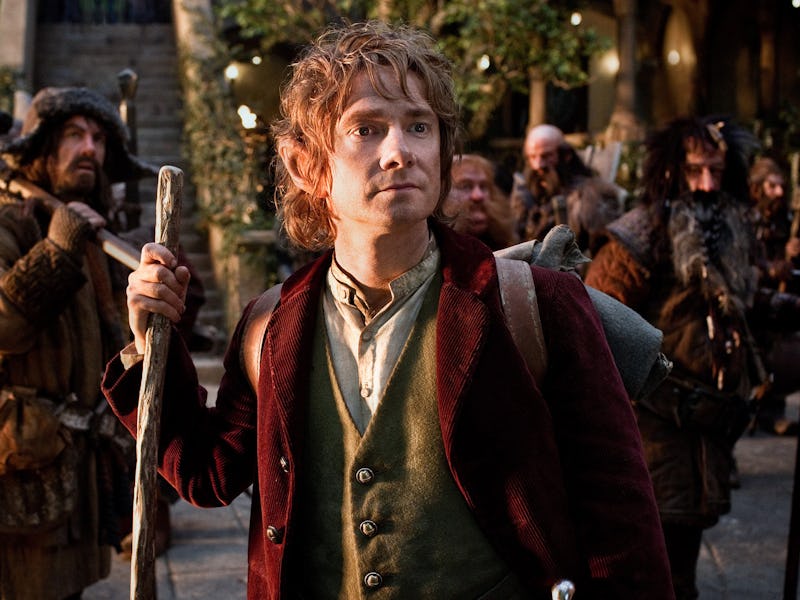You need to watch the best epic trilogy of the 2010s before it leaves HBO Max this week
In the 2010s, Hollywood went overboard with two-part adaptations of single fantasy novels. But it never got wilder than this one children's book becoming an epic trilogy.

It's rarely wise to split a good book in two. But wisdom and Hollywood don't always go hand in hand.
Hence, a grim tradition of the 2010s, as movie studios carved up adaptations of beloved novels into multiple franchise entries. Some examples: Harry Potter and the Deathly Hallows divided into two parts for the franchise's grand finale, similar treatment for the Twilight movies with Breaking Dawn, and a two-part Mockingjay closing out what should have otherwise been a Hunger Games trilogy.
One reasonably sized story, carved up and separated out into two artistic entities… the audacity of such a thing. And yet, not even close to as audacious as the case with this beloved fantasy franchise, in which a single children's novel was turned into not one, not two, but three movies altogether.
Based on J.R.R. Tolkien's book of the same name, The Hobbit trilogy is Peter Jackson's follow-up to his award-winning Lord of the Rings movies. Among the most robust fantasy franchises around (the extended editions can kill an entire day), the Lord of the Rings trilogy earns its length runtime. The three Hobbit movies, on the other hand? Not so much.
The Hobbit centers on Bilbo Baggins (Martin Freeman), a hobbit who enjoys adventure as much as he enjoys skipping meals — which is to say, not very much at all. But adventure finds him all the same, as Thorin Oakenshield (Richard Armitage) and his small army of dwarves recruit Bilbo on a quest to reclaim lost glory.
Alongside Lord of the Rings MVP Gandalf the Grey (Ian McKellen), who is very much in the novel The Hobbit films are based on and LotR veteran Legolas (Orlando Bloom), who is very much not in the novel, Bilbo and company set out on an adventure that has them crossing paths with elves, eagles, and even a dragon. Not everybody makes it out alive, but it's still a somewhat slender story with a mostly happy ending.
Except it's not a slender story, at least not in the movies.
A single novel stretched across three films, The Hobbit trilogy wasn't even meant to be a trilogy at first. A beleaguered production that initially saw Guillermo del Toro directing and Peter Jackson producing, The Hobbit was originally supposed to be two movies. After stepping in as director, however, Jackson and company decided there was so much material (thanks to drawing in stories from Tolkien's own extended works) that fitting it all into two movies was not possible. And so, a third movie was born, a dark work not unlike the One Ring itself.
It's less that The Hobbit trilogy is bad and more that it's totally unnecessary and misguided, a bloated attempt at rebottling that Lord of the Rings lightning. A single movie would have more than sufficed, as evidenced by popular fan edits that trim the films down to a single four-hour story. But there are still reasons to value Jackson's Hobbit movies, both from historical perspectives, but also for some moments that are truly next-level — the confrontation between Bilbo and Andy Serkis' Gollum is one of the best scenes in any live-action Tolkien adaptation.
(See also: Benedict Cumberbatch's work as Smaug the Dragon; his scenes opposite Freeman's Bilbo are the CGI-filled fantasy version of Sherlock we never knew we needed.)
With Amazon's upcoming Lord of the Rings show, more people than ever are going to seek out the preceding films. These new fans are deeply encouraged to check out Jackson's Lord of the Rings movie, with only one asterisk: watch the extended editions. Oddly, the opposite advice for the Hobbit trilogy is wisest — seek out a slimmed-down cut — but with yet another asterisk: watch the full trilogy so you can fully appreciate just how stuffed this thing was.
The Hobbit movies are as bold as it gets in the fantasy genre, so much bigger than it needs to be to the point you almost need to respect the bloat. It's an audacious adaptation filled with hidden gems, but you need to get under the hood of so much material in order to find the treasure. No better time than now to go sifting through the gold, before Amazon's dragon-sized Lord of the Rings follow-up flies into town.
The Hobbit trilogy leaves HBO Max on April 30.